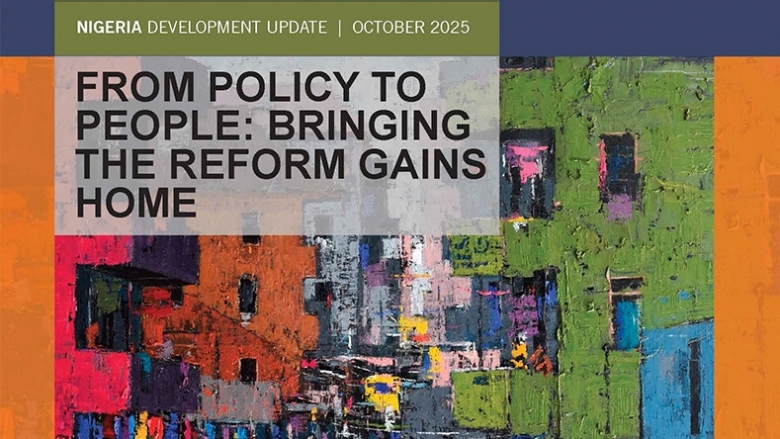Abuja, Nigeria, October 8, 2025 – Nigeria has made notable progress in stabilizing its economy through recent policy adjustments, yet significant work remains to ensure these improvements enhance everyday living conditions, according to the World Bank’s latest Nigeria Development Update (NDU) released today.
The report, titled “From Policy to People: Bringing the Reform Gains Home,” highlights advancements in economic expansion, revenue collection, monetary management, and external financial balances. At the same time, it emphasizes ongoing issues such as elevated food prices, widespread economic hardship, and systemic obstacles that hinder broad-based development.
Data from the NDU indicates that Nigeria’s economy grew by 3.9% year-on-year during the first half of 2025, an increase from 3.5% over the same period in 2024. This growth was fueled by strong performances in service sectors and non-oil industries, along with gains in oil output and agricultural production. The nation’s external financial position has improved, with foreign reserves surpassing $42 billion and the current account surplus reaching 6.1% of GDP—driven by increased non-oil exports and reduced oil imports. On the fiscal front, despite lower global oil prices, the federal government’s deficit is projected at 2.6% of GDP for 2025, similar to 2024 levels, while public debt is expected to fall from 42.9% to 39.8% of GDP—the first decline in over ten years.
Despite these macroeconomic improvements, the report warns that many citizens have not yet felt meaningful benefits. A large portion of households continue to struggle, with high poverty rates and limited access to affordable food. Food inflation remains a critical issue: low-income families, who allocate up to 70% of their earnings to food, have experienced a fivefold increase in the cost of basic food items between 2019 and 2024. While current reforms are correcting long-standing economic distortions, lasting improvements in living standards will require sustained efforts to control inflation, promote inclusive development, enhance public services, and expand aid for vulnerable populations.
“The Nigerian government has taken bold steps to stabilize the economy, and these efforts are beginning to yield results,” said Mathew Verghis, World Bank Country Director for Nigeria. “But macroeconomic stability alone is not enough. The true measure of success will be how these reforms improve the daily lives of Nigerians—especially the poor and vulnerable.”
To close the gap between economic indicators and real-world welfare, the report outlines three key priorities:
First, addressing food inflation by eliminating trade restrictions like import bans and excessive tariffs, while also resolving structural challenges related to seed availability, input supply, security, logistics, and infrastructure such as transportation, energy, storage, and cold chain systems.
Second, enhancing the effectiveness of public expenditure through greater budget transparency, stricter oversight of Federation Account allocations, and a national agreement to align fiscal strategies with development goals, particularly investments in human capital.
Third, expanding and formalizing social protection systems, including regular, domestically funded cash transfers for the poorest citizens and adaptive safety nets that help families cope during crises.
— news from World Bank
— News Original —
Positive Economic Momentum in Nigeria, Now Time to Bring Home the Gains
Abuja, Nigeria, October 8, 2025 – Nigeria has taken important steps toward stabilizing its economy through recent policy reforms, but more needs to be done to ensure these gains translate into better living standards for its citizens, according to the latest Nigeria Development Update (NDU) released by the World Bank today. n nTitled “From Policy to People: Bringing the Reform Gains Home,” the report notes progress in economic growth, domestic revenue mobilization, monetary policy, and external balances—while underscoring persistent challenges such as high food inflation, widespread poverty, and structural barriers that constrain inclusive growth. n nAccording to the NDU, Nigeria’s economy expanded by 3.9% year-on-year in the first half of 2025, up from 3.5% in the same period of 2024. Growth was driven by strong performance in services and non-oil industries, alongside improvements in oil production and agriculture. The country’s external position has strengthened, with foreign reserves exceeding $42 billion and the current account surplus rising to 6.1% of GDP, supported by higher non-oil exports and lower oil imports. On the fiscal side, despite lower oil prices, the federal deficit is projected at 2.6% of GDP in 2025, broadly unchanged from 2024, while public debt is expected to decline for the first time in over a decade—from 42.9 to 39.8% of GDP. n nHowever, the report cautions that these macroeconomic gains have yet to translate into tangible improvements in people’s lives. Many households continue to face hardship, with poverty and food insecurity remaining high. Food inflation remains a major concern: poor households—who spend up to 70% of their income on food—have seen the cost of a basic food basket rise fivefold between 2019 and 2024. The NDU notes that while current reforms are addressing long-standing policy distortions, sustained progress in livelihoods will depend on continued efforts to reduce inflation, foster inclusive growth, strengthen public services, and expand support for the most vulnerable. n n“The Nigerian government has taken bold steps to stabilize the economy, and these efforts are beginning to yield results,” said Mathew Verghis, World Bank Country Director for Nigeria. “But macroeconomic stability alone is not enough. The true measure of success will be how these reforms improve the daily lives of Nigerians—especially the poor and vulnerable.” n nTo help bridge the gap between macroeconomic progress and improved welfare, the report identifies three urgent priorities: n nTackling food inflation by removing trade barriers such as import bans and excessive duties, while addressing structural bottlenecks in seeds, input supply, security, logistics, and infrastructure (including transport, power, storage, and cold chains). n nImproving the efficiency of public spending through greater fiscal transparency, stronger discipline in Federation Account (FAAC) deductions, and a national pact to align fiscal policy with development objectives, especially human capital investments. n nExpanding and institutionalizing social protection, including regular, domestically financed cash transfers for the ultra-poor and a shock-responsive safety net system to help households manage crises.
